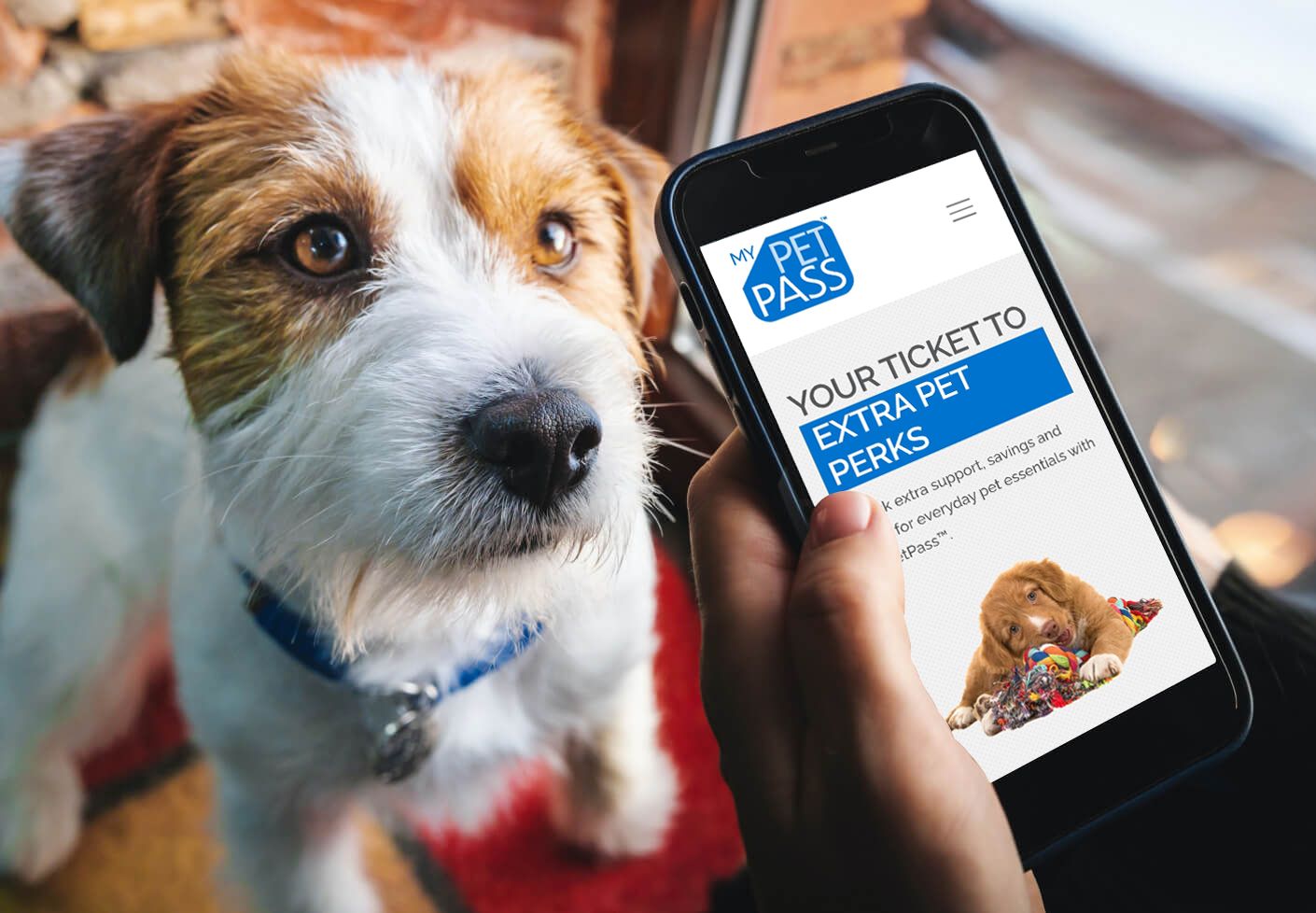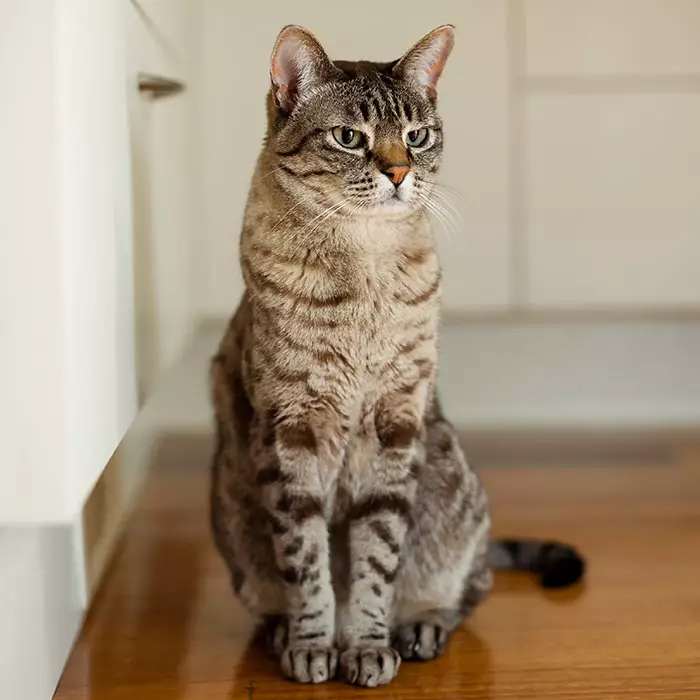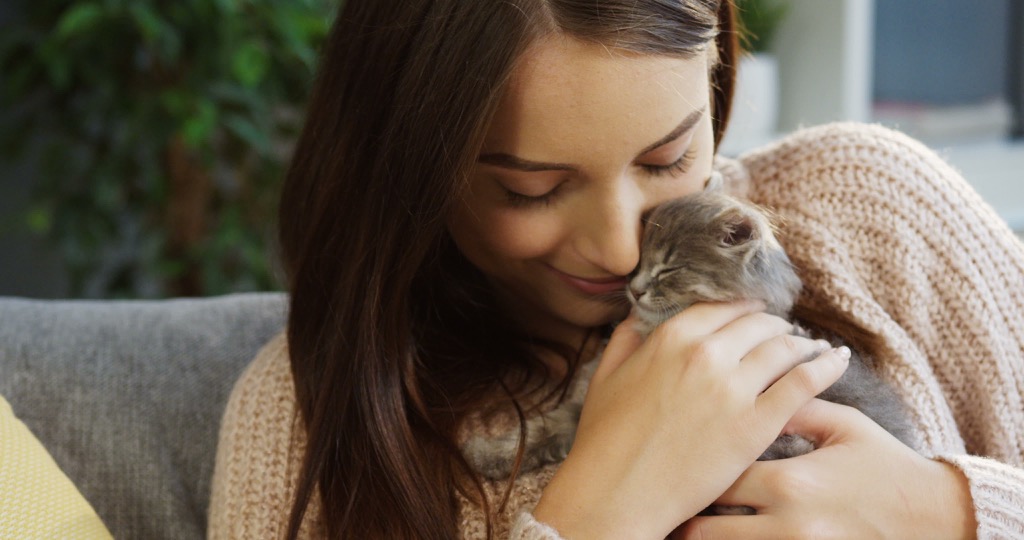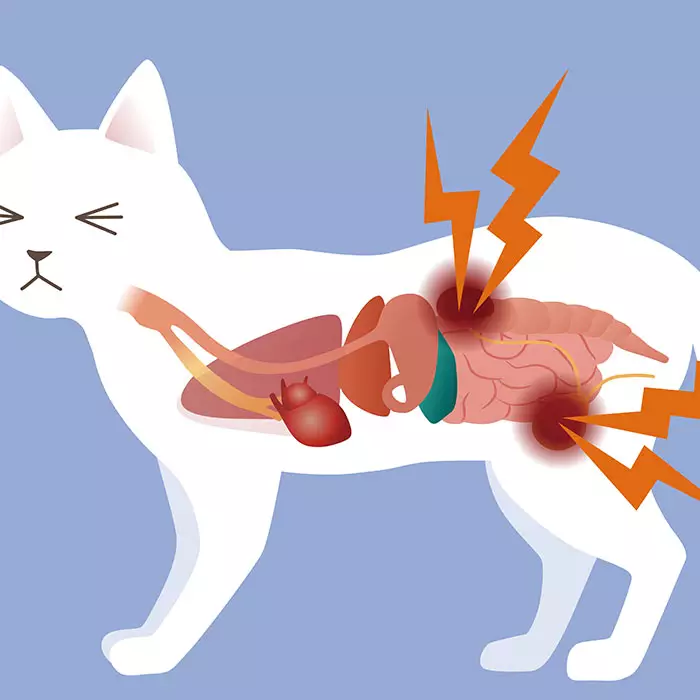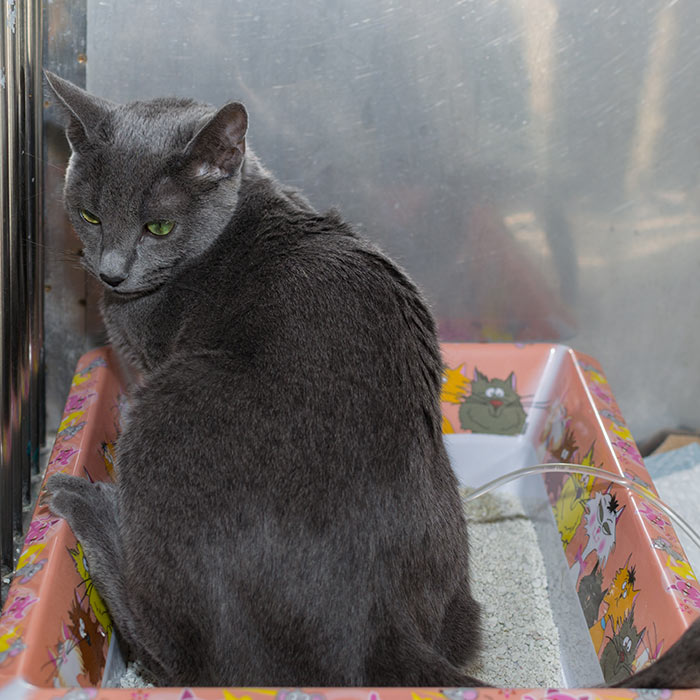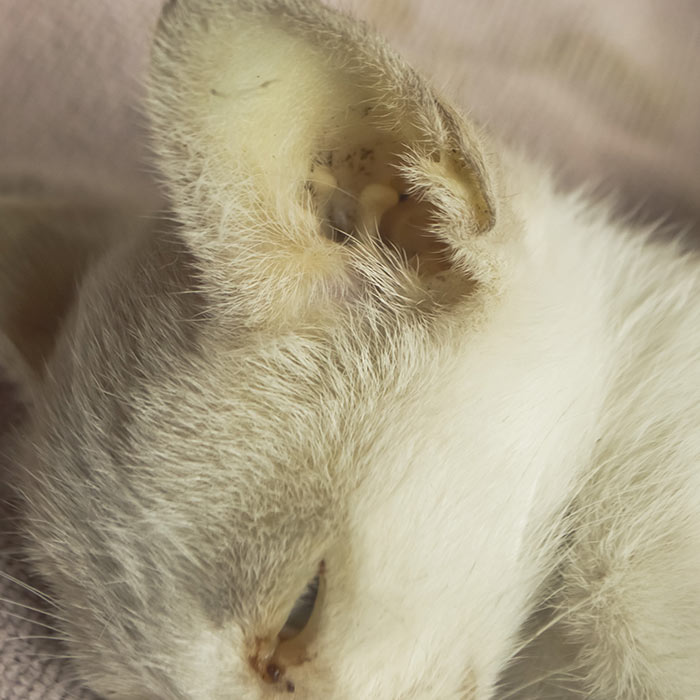Colitis in felines | Cat bowel disease
What is colitis in cats?
Feline colitis is a chronic bowel disease resulting from inflammation of the colon. The colon, also known as the large intestine or large bowel, is the lower part of the digestive tract which is responsible for the final stages of the digestive process. The colon stores and removes water from the faeces (poo) prior to their elimination from the body. When the lining of the colon becomes irritated and inflamed, the colon’s ability to absorb water from the faeces is disrupted, resulting in loose, watery and sometimes bloody faeces.
Colitis in cats can be acute, coming on suddenly and lasting only a few days, chronic, lasting for at least two to three weeks, or episodic, coming and going over time. Occasional bouts of acute colitis are fairly common in cats and usually resolve on their own. However, it is important to look out for frequent recurrence or worsening of the condition. Chronic feline colitis is more common in middle-aged and older cats and is often associated with an underlying medical condition.
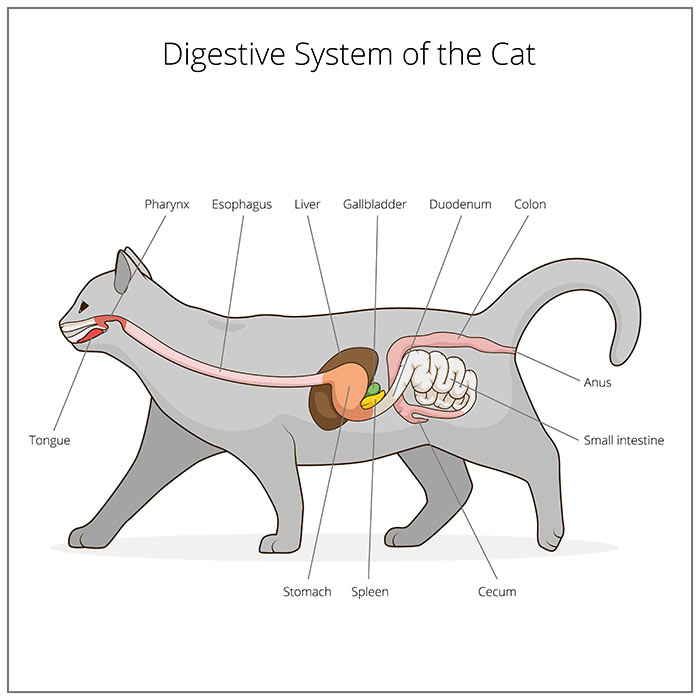
Symptoms of colitis in cats
The symptoms of colitis can range from sporadic and mild to enduring and severe. As the owner of a cat with colitis, you may observe a combination of the following symptoms:
Faeces-related symptoms, commonly observed in cats with acute, chronic and episodic colitis:
- Frequent diarrhoea – stools may start off solid but finish off watery and loose
- Straining to defecate
- Appears constipated (tenesmus)
- Difficult or painful evacuation (dyschezia)
- Frequent bowel movements where little is passed
- Bright, fresh red blood in the faeces (hematochezia)
- Mucus in the faeces
- Increased urgency to get to the litter box, defecating outside the litter box
Additional symptoms more common to chronic and episodic colitis:
- Poor appetite
- Progressive weight loss
- Lethargy
- Sleeping more than normal
- Vomiting – in around 30% of cases
- Dehydration
- Loss of appetite
- Poor coat and body condition
- Shying away from being touched
- Hiding from people or other pets
Causes of colitis in cats
Inflammation of the colon can be triggered by a wide-range of factors, from ingesting human food products to parasites and funguses in the cat’s gastrointestinal tract. There are also certain diseases, such as hyperthyroidism and diabetes, that can cause or contribute to colitis in cats. It is essential to identify the specific cause in each case of feline colitis, so that appropriate diagnosis and treatment can follow.
Some of the more common causes of colitis in cats are:
- Stress and anxiety – a break in routine, a new pet in the family, moving houses
- A reaction to antibiotics or other medicines
- Dietary intolerance, usually in response to a substance in the diet such as a preservative or food colouring
- Dietary allergy, usually resulting from a reaction with a protein antigen such as beef, wheat and corn
- Consumption of unsuitable foods, for example, spoiled food, a plant or garbage
- Consumption of a foreign body
- Infectious agents, such as:
- Bacterial infections, for example salmonella, campylobacter, E.coli
- Intestinal parasites, for example roundworms, giardia, coccidia, tritrichomonas foetus, protozoal infection
- Viral infections, including Feline leukemia virus (FeLV), Feline immunodeficiency virus (FIV), Feline infectious peritonitis (FIP)
- Fungal agents
- Primary gastrointestinal disorders, such as:
- Specific inflammatory disorders of the colon (different cell types found in the colon may be predominantly inflamed)
- Inflammatory or irritable bowel disease (IBD)
- Acute infectious enteritis
- A primary disease or disorder that causes or contributes to colitis or colitis-like symptoms in cats, such as:
- Colonic and bowel cancers
- Diabetes
- Kidney disease
- Hyperthyroidism
- Pancreatitis
- Intussusception (telescoping of the bowel into itself)
How is colitis in cats diagnosed?
If a bout of diarrhoea lasts for longer than a few days, or if diarrhoea becomes a recurring issue, it is essential to take your cat to the vet to investigate why. Colitis is a complicated condition that requires an accurate diagnosis before effective treatment can commence. Other illnesses may cause similar clinical symptoms, and these should be considered when a cat is evaluated for colitis.
As there are many potential causes of colitis in cats, you will need to inform your vet of your cat’s complete history, including:
- Symptoms you have noticed
- Recent exposure to other cats
- Diet, and any recent changes to it
- Anything out of the ordinary that your cat may have eaten, such as people-food, trash
- Anywhere out of the ordinary that your cat may gone
If colitis is suspected, your vet will perform a combination of tests to identify the underlying cause, including:
- Chemistry profile to evaluate for diabetes mellitus, kidney, liver, and pancreatic disease
- A complete blood count (CBC) to look for infection, inflammation, anaemia, and other blood-related conditions
- Faecal tests to look for parasites, bacteria and giardia
- Urinalysis to assess kidney function
- X-rays to evaluate the gastrointestinal tract and thickness of the intestines, and to check for abnormalities such as tumours and fluid
- Ultrasound to image the digestive tract and other abdominal organs
- Electrolyte tests to check for dehydration and electrolyte imbalance
- Tests to look for viral infections, such as FeLV and FIV
- Pancreas-specific tests to rule out or confirm pancreatitis
- Serum thyroid hormone concentration to investigate hyperthyroidism
- Tests to investigate FeLV and FIV status
Additional tests may performed if routine tests are inconclusive or if the colitis is severe or does not resolve with treatment, such as:
- Colonoscopy with a flexible fibreoptic endoscope, to visualise the lining of colon in order to ascertain the type of inflammatory cell present, check for polyps and tumours and take biopsies of the inner surface of the colon for microscopic examination
- Proctoscopy (endoscopic examination of the rectum) to examine and take biopsy samples of the terminal end of the colon
Life expectancy
The outlook for cats with colitis varies greatly, depending on the cause of the condition and the effectiveness of the treatment provided. If the cause is eliminated or effectively managed, the prognosis for long-term control is good. Most infectious causes of colitis are curable. However, if treatment does not resolve the cat’s colitis, colon cancer or another serious illness or disorder might be involved, which greatly alters the prognosis.
Treatment for colitis in cats
The therapeutic goals of treatment for feline colitis are to relieve pain and discomfort, and to restore normal bowel function. If there is an underlying medical condition which is causing colitis or colitis-type symptoms, this will need to be identified and treated.
The choice of treatment will depend on the causes of the inflammation and the frequency and severity of symptoms. Acute colitis often resolves itself in a few days without requiring treatment; however, chronic or episodic colitis almost always requires medical attention. Where the cause is an infection or parasite, colitis can be cured, but generally, it can only be controlled through appropriate medical management and dietary modification.
Dietary modification
Symptoms of colitis may resolve simply by changing the cat’s diet, often within a week of making the changes. There is no one ideal diet that will consistently resolve colitis in cats. Your vet may recommend one or more of the following options:
- Fasting – withholding food for 24 to 48 hours to rest the digestive system and help minimise the severity of colitis (under the vet’s supervision)
- Bland diet, given in small portions, for example rice, fat-free, plain flavoured yogurt, pumpkin, plain cooked chicken
- Soluble fibre added to the diet (in the form of food or supplements, for example psyllium) – may relieve straining and discomfort; the amount of fibre may be gradually reduced
- Fatty acid supplements – soothe the irritated lining of the colon
- Elimination diet – cutting out certain foods – if food allergies or intolerances are suspected
- Novel protein diet – a single, new form of protein, such as venison, lamb or rabbit (vet-prescribed is preferable to over-the-counter, which may contain allergens not listed on the label)
- Hydrolysed diet – a single protein source, often soy, rice or potato, that has undergone a process that makes them highly digestible
- Prebiotic diet – contains highly fermentable fibres, can increase “good” bacteria and inhibit some pathogenic bacteria
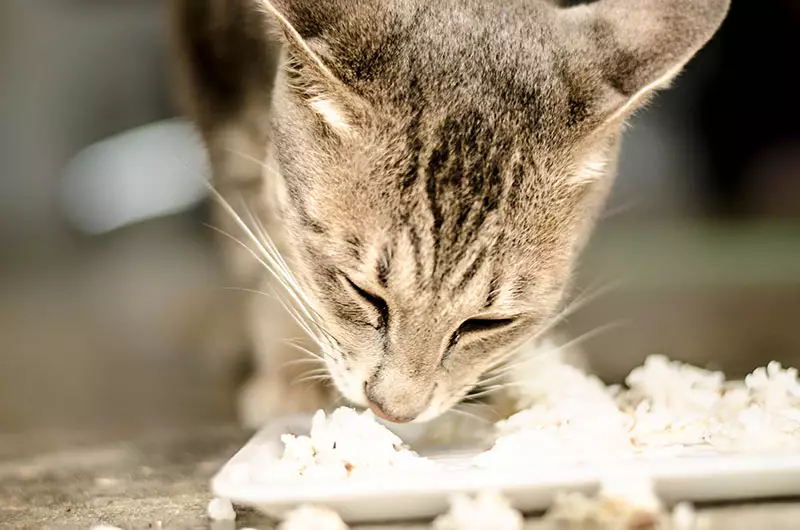
Medication
- Anti-inflammatory medication – to facilitate faster improvement
- Medication that thickens the faeces (oral motility modulator), for symptomatic relief until the inflammation is under control
- Anti-parasitic and deworming medication, if intestinal parasites are identified
- Antibiotics, if dietary modification is unsuccessful – these work by changing the balance of the “good” and “bad” bacterial population of the colon and can be effective even where a bacterial cause of colitis s not established
- Probiotics, or live microorganisms, that, taken alone or in combination with antibiotics, can be beneficial in modifying the gut bacteria for as long as they are being taken
- Immunosuppressive drugs – corticosteroids –in severe cases and/or where dietary modification and antibiotic treatments have failed, which requires careful monitoring by the vet
Hospitalisation
Hospitalisation may be required if the colitis is severe, particularly diarrhoea, which can cause dangerous dehydration that requires treatment with intravenous fluid and electrolyte replacement.
Environmental factors
- Ensure that fresh water is freely available and easily accessible
- Provide a calm, quiet, safe indoor environment, away from other animals if possible
Overview
Colitis in cats occurs when the colon is inflamed, usually resulting in pain and discomfort. Colitis can either be chronic, lasting for long periods of time, or acute, occurring for just a few days and resolving on its own without treatment. One of the main symptoms of colitis is diarrhoea, or loose and watery stools.
Colitis is a complicated condition that requires an accurate diagnosis before effective treatment can commence. Your vet will perform a physical examination and do a combination of tests to identify the cause. Treatment in most cases entails dietary modification and /or medication.
Bow Wow Meow Pet Insurance can help protect you and your cat should an unexpected trip to the vet occur.
-
Find out more about our cat insurance options
-
Get an online pet insurance quote


More information
http://www.pethealthnetwork.com/cat-health/cat-diseases-conditions-a-z/colitis-cats
https://www.petwave.com/Cats/Health/Colitis.aspx
https://www.petcarerx.com/article/5-causes-of-colitis-in-cats/2789
https://www.cat-world.com.au/colitis-in-cats.html
https://www.petplace.com/article/cats/pet-health/colitis-inflammation-of-the-colon-in-cats/
https://weethnutrition.wordpress.com/2014/12/04/let-talk-about-poop/

